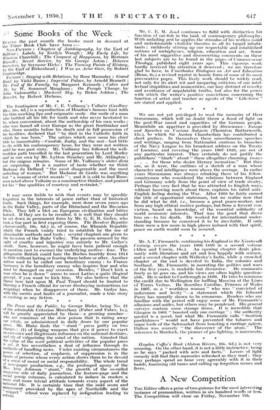The frontispiece of Mr. C. E. Vulliamy's Voltaire (Geoffrey files,
10s. 6d.) is a reproduction of Houdon's famous bust with the thin mocking lips and enigmatic smile—the smile of a man who battled all his life for truth and who never hesitated to lie, when convenient, about the authorship of his own works who was famed all over Europe as the great freethinker and who, three months before his death and in full possession of his faculties, declared that " he died in the Catholic faith in which he was born." The satires which now seem his chief title to immortality—Candidc, Zadig, and the rest—had little to do with his contemporary fame, for they were not written until he was past sixty. Mr. Vulliamy has followed the well- trodden path travelled in the last generation by Lord Morley and in our own by Mr. Lytton Strachey and Mr. Aldington ; but the enigma remains. Some of Mr. Vulliamy's obiter dicta are surprising. It is a matter of taste whether we think Madame du Deffand " the most disagreeable and the most unfeeling of women." But Madame de Geniis was anything but " a woman of strict morals " ; and it is odd to find Rous- seau rated above Voltaire as a constructive thinker, and praised for his fine qualities of courtesy and restraint."
* * * *










































 Previous page
Previous page